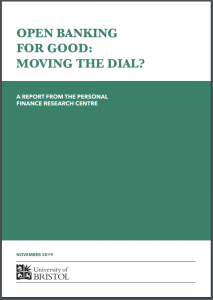By Sharon Collard & Jamie Evans
Nowadays, fintech startups often emerge with the ambition of ‘doing good’ and changing society for the better. This surely is to be welcomed – but what is the best way of ensuring it actually makes a positive difference to consumers? In this blog, we attempt to answer this question, outlining the first stage in our evaluation of Nationwide’s Open Banking for Good (OB4G) programme.
As its name suggests, OB4G was set-up with the ambition of being ‘for good’. Launched by Nationwide in 2018, it is a £3 million programme which aims to leverage Open Banking technology to create and scale new apps and services, all of which are designed to help the 12.7 million adults in the UK who are ‘financially squeezed’. The ambition to support this group of consumers – who tend to have high debt-to-income ratios, coupled with low savings – is clearly a positive one, but how can those designing innovation programmes turn this ambition into reality?
That is the question Nationwide has asked us to explore through an independent evaluation of the OB4G programme. We have already published a report outlining the lessons from the ideation and implementation of OB4G, and we share below three key lessons that we believe can inform the design of future ‘fintech for good’ efforts. We continue to support the successful OB4G fintechs (who we call Challengers) in measuring the financial and social impacts of their Open Banking-enabled products and services on end-users throughout, with a final report scheduled for Q2 2020.
Lesson #1: Problems looking for solutions, not solutions looking for problems
One of the early lessons of the programme is the importance of identifying real-world problems that might benefit from tech solutions – rather than retrospectively finding a socially useful purpose for an existing product or service.
To do this, the OB4G team at Nationwide involved charity partners from the very beginning to identify the real-life challenges facing people who are ‘financially squeezed’ that the programme could tackle. These charity partners – including Citizens Advice, Christians Against Poverty, the Money Advice Trust, the Money and Mental Health Policy Institute, and The Money Charity – have great insights into the needs of people living on a financial knife-edge, and so were well-placed to identify the issues facing consumers and help shape the programme. In the words of one challenger, this helped overcome the risk of ‘hipsters designing for hipsters’!
Lesson #2: Locking the ‘innovation cage’
Together, the charity partners and Nationwide’s OB4G team identified three pressing challenges for the OB4G programme to tackle:
- Income Smoothing – helping the growing number of people who have irregular or unpredictable income to manage their regular outgoings
- Income & Expenditure – making it easier for someone to produce an accurate statement of their income and expenditure
- Money Management & Help – helping people to practice and maintain good money habits
In our qualitative interviews with OB4G Challengers, they emphasised the value of having well-defined real-life problems to solve, which kept them tightly focused on doing one thing well for a particular consumer segment. This was described by one as an ‘innovation cage’ that allows creative freedom and innovation but in a way that keeps the social purpose of OB4G front and centre.
Importantly, the startups were not alone in their ‘innovation cage’! They were partnered with a charity (or in some cases more than one charity), which could contribute its knowledge and insight about the target audience throughout the development process. This element of ‘co-creation’ was almost as valuable to the Challengers as funding.
Lesson #3: The challenge of different ways of working
Our evaluation not only sheds light on what works, but also on challenges that innovation programmes like OB4G invariably encounter. One such issue was the very different ways in which startups and established organisations work – whether charities or a large commercial organisation like Nationwide.
While ‘agile’ working is part and parcel of fintech startup culture, for charities – whose focus is often on fire-fighting and delivering their core purpose – this can be harder to achieve. The same is true for large commercial organisations, where there may be many layers of bureaucracy to navigate in order to get things done. So while the startups hugely valued the insight and support they got from OB4G, there were times when things didn’t move quite as quickly as they would have liked.
The key lesson for fintechs and innovation programme designers is that, yes, it is hugely beneficial to work with charities and people with lived experience to co-design products and services. BUT you need to build in sufficient time (and understanding) to make this happen. Our evidence also indicates that programmes should routinely offer to fund Charity Partners for their contribution (even if Charity Partners aren’t always able to accept such funding).
What next?
So far, our evaluation has focused on the process of setting up and running the OB4G programme. We are now considering the impact that OB4G actually has on consumers. As such, we are working with the five remaining Challengers – Ducit, Openwrks, Toucan, Trezeo and Tully – to measure the effect of their products on consumers’ financial wellbeing. Our aim is to make a useful contribution to a growing body of evidence around how fintech startups can actually ‘do good’ and make a difference to the lives of their users.
Read the first stage of our evaluation here:
Report: ‘Open Banking for Good: Moving the Dial?’

